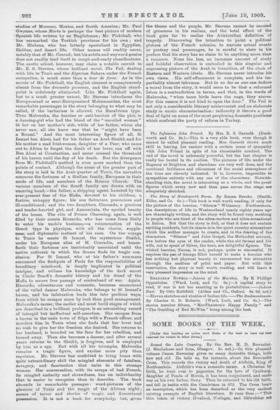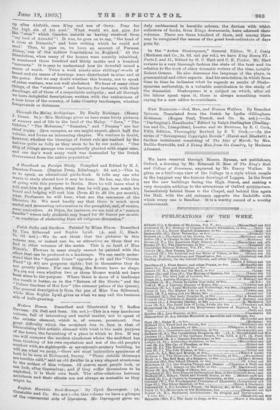SOME BOOKS OF THE WEEK
[Woo' this heading we notice enok Books qf the week as Nava not WO roused for review other forma Round the Lake Country. By the Rev. H. D. Rawnaloy. (J. MacLehose and Sons, Glasgow. 5s. net.)—In this pleasant volume Canon Rawnsley gives us many desirable things, both new and old. He tells us, for instance, about the Bewcastle Cross, This records the victory and death of Alcfrith, King of Northumbria. Alcfrith's was a romantic career. A Christian by birth, ho went over to paganism for the love of Cyniburg, daughter of Penda of Mercia, it has been conjectured, and made war on his own father, Oswy. Then he returned to his old faith, and fell in battle with the Cumbrians in 670. The Cross bears an inscription, which has been described as the very earliest existing example of English literature. It runs thus :—" This thin token of victory liwalhed, Wothgar, and Olfwolther set the after Alcfrith, once King and son of Oswy. Pray for the high sin of his soul." What would we not give for the "stop" which Camden records as having received from "my lord of Arundel"! It was, he goes on to say, "the head of a cross at Bncastle," and bore writing which he could not read Then, to pass on, we have an account of Furness Abbey, one of the noblest foundations in. England. At the Dissolution, when many of the houses were scantily inhabited, it numbered three hundred and thirty monks and a hundred "converts." It is easy to understand how its downfall raised a storm of wrath. Twice a week ninety-nine shillings'-worth of bread and six mazes of herrings were • distributed in alms and at the gates. But wo may doubt whether this bounty, not to speak of .other matters, was not well abolished. We hear of many other 'things, of the "statesmen" and farmers, for instance, with their . dwellings, all of them of a respectable antiquity ; and all through We have delightful descriptions, written with the enthusiasm of a true lover of the country, of Lake Country landscapes, whether foregrounds or distances.











































 Previous page
Previous page